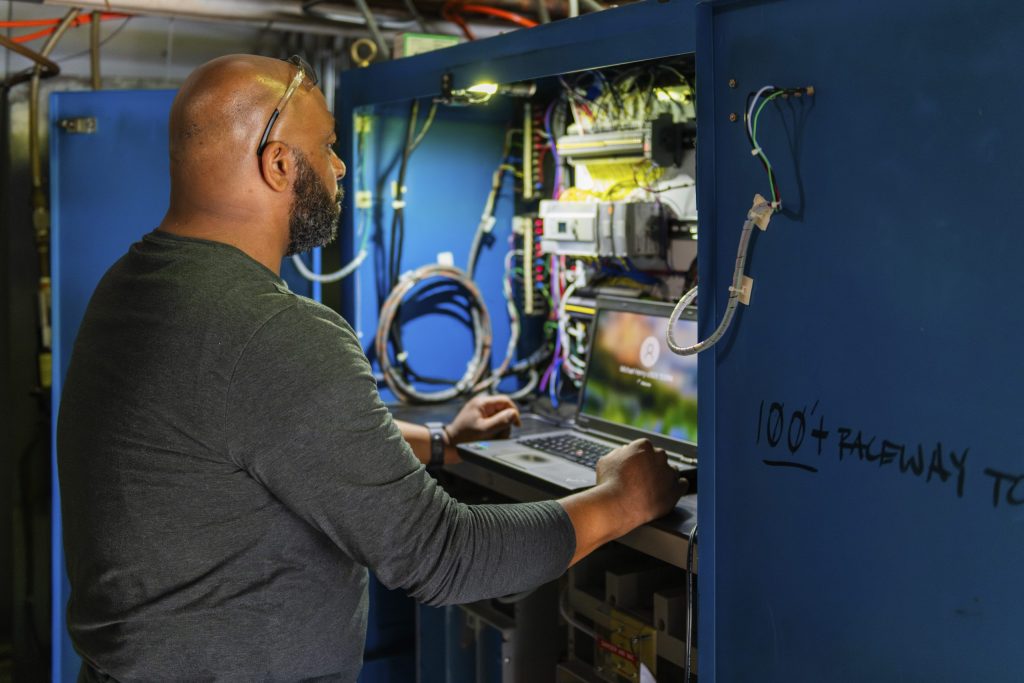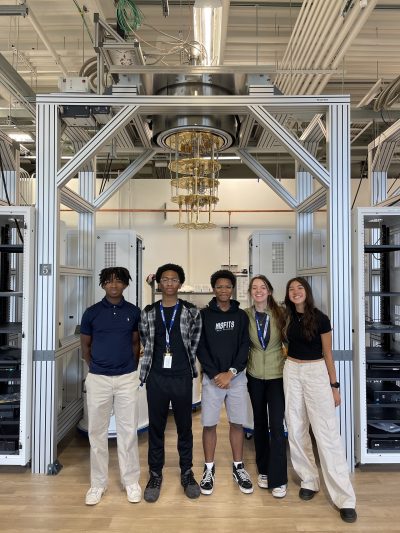Students with an interest in accelerator engineering or quantum computing, but who may not have sufficient resources at their home colleges, will soon have new options through the U.S. Department of Energy’s Fermi National Accelerator Laboratory.
In August, the DOE announced the list of programs that would receive grants through the Reaching a New Energy Sciences Workforce, or RENEW, initiative. This program connects DOE national laboratories and other research facilities with academic institutions to fund opportunities for faculty members and students from groups underrepresented in science research. This year is the second round of RENEW grants.
“The goals of RENEW are two-fold,” said Amanda Early, a co-principal investigator for one of Fermilab’s RENEW grant-funded projects. “One is to provide research and traineeship opportunities to students from groups underrepresented in STEM fields. Another goal is to build research infrastructure at institutions that have not historically participated in particle physics research.”
Fermilab is directly involved with two programs that received a RENEW grant. One program offers a certificate program for particle accelerator electrical technicians, while the other promotes educational opportunities for students interested in quantum information research.
“We are happy to host two programs at Fermilab funded by the RENEW program,” said Sandra Charles, Fermilab’s chief equity, diversity, inclusion and accessibility officer. “These educational opportunities are workforce development initiatives that provide opportunities for students to gain valuable hands-on training to successfully launch interesting and secure STEM careers.”
Preparing prospective technicians for particle accelerators
Aisha Ibrahim, a senior engineer in Fermilab’s accelerator division, identified a need for more well-trained electrical technicians who can specifically work on particle accelerators. Because she is involved in outreach programs, Ibrahim also saw a need for a coordinated effort to recruit technicians from underrepresented groups. She said it’s important to provide increased support to students from institutions that don’t have as many resources.
“It’s not always enough just to provide an opportunity,” said Ibrahim, another co-principal investigator of the RENEW grant-funded accelerator technician training program. “What we heard from institutions is, ‘We would love to send students to a program, but we don’t have the proper research capabilities or coursework to provide confident candidates for that program. Sometimes we almost feel like we’re setting them up to fail.’”
During the application period for the first round of RENEW grants, Ibrahim and Early submitted a proposal for an idea to bridge this gap. The proposal idea was well-received, but the program plan needed to be more specific. During this second round of grant applications, they narrowed their focus to growing need for more electrical technicians, and the idea evolved into the Particle Accelerator Capabilities Enhancement and Modernization Apprenticeship Program, or PACEMAP.

Senior technician Michael Henry Jr. inspects equipment for an upcoming experiment. PACEMAP students will be trained as electrical technicians to work on similar equipment while completing coursework at the College of DuPage. Photo: Ryan Postel, Fermilab
A collaboration between Fermilab and the College of DuPage, a community college in Glen Ellyn, Illinois, PACEMAP will pilot a two-year apprenticeship program that will provide participants with an electrical technician certificate, customized for work within accelerators. The students would take initial classes at the College of DuPage, then they join Fermilab as part-time employees where they have on-the-job training and attend seminars focused on various accelerator topics and issues.
“The goal of this program,” Early said, “is to create a qualified pipeline of individuals.”
The funding from the RENEW grant will help cover the cost of the courses and the part-time salaries for a pilot cohort of six participants. It also includes a stipend for the students during the semester of courses before working at Fermilab.
After taking these courses, gaining this experience and earning this certificate, the students will have the technical skills necessary to work on particle accelerators. There is a need to hire more such technicians, Early said.
“We have the accelerator division with the accelerator complex as it is, but the PIP-II particle accelerator is being built, and when that comes online, it’s going to present a whole new set of challenges,” she said. “We are not finding qualified applicants at a pace that is going to meet our workforce needs.”
Ibrahim said a major hiring hurdle has been finding qualified candidates; they often lack specific skills needed to work on accelerators.
The unique technology and safety requirements for working on a particle accelerator cannot be fully demonstrated in a classroom setting, making the on-the-job experience offered through PACEMAP critical for these students, Early said.
“Lab settings in a classroom are typically very controlled: You’re going to be given a specific set of instructions, and it always seems to work. But working at Fermilab, that’s not always going to be the case,” she said. “There’s always this skill gap that exists from classroom to actual work, and it really helps to close that gap — and that builds confidence.”
Bringing quantum computing courses to new classrooms
The Superconducting Quantum Materials and System Research Center, led by Fermilab, received another RENEW grant to support workforce development and educational opportunities with minority serving institutions. The SQMS Center is one of five DOE National Quantum Information Science Research Centers in the country. The research center specializes in investigating superconducting devices used in quantum information systems, said Silvia Zorzetti, the principal investigator on the RENEW grant-funded initiative at SQMS.

High school TARGET Interns tour the Quantum Garage where interns will conduct research for the RENEW-funded SQMS traineeship program. Photo: Hannah Adams, Fermilab
For this RENEW grant, Fermilab is the lead institution, partnering with the University of Illinois at Chicago, Coppin State University in Baltimore and Spelman College in Atlanta, all three of which are considered minority-serving institutions. These institutions plan to join SQMS formally, and SQMS researchers will assist principal investigators in building quantum infrastructure and facilities at their respective institutions. Through this RENEW grant, these SQMS partner institutions will offer career path opportunities in quantum information research with hands-on research experiences.
SQMS not only aims to advance quantum information science and technology research, but also to collaborate with the community of quantum information research at large, Zorzetti said. She leads the effort to work with industries and promote workforce development in the quantum information sector.
Over the next three years, the RENEW grant will fund the development of quantum facilities and coursework at these three colleges, along with research periods at Fermilab.
“Through these efforts, the colleges will engage with students from a diverse population,” said Zorzetti. “Then, these students will have a chance to do research in our laboratories.”
Interest is growing in quantum information research, Zorzetti said. Each time SQMS offers an internship, more than 100 students apply, and more than 300 people applied to attend the recent inaugural U.S. Quantum Information Science school at Fermilab. Many of these applications come from students from groups historically underrepresented in research, and about half of the applications are from women.
“We find that quantum is acting as a gateway to increase diversity in our workforce,” she said. “There is momentum around quantum, so RENEW is a great opportunity to expand our partnerships with minority-serving institutions to try to bring in a new and more diverse quantum workforce.”
Ambitious research, such as the research conducted at Fermilab, requires innovation, Early said. Bringing together people from different backgrounds, experiences, and skill sets can spur on this innovation.
“I feel that if you are in a room that is diverse, then the discussion is more interesting,” Zorzetti also said. “Bringing together people with different backgrounds can really enrich our program.”
Fermi National Accelerator Laboratory is supported by the Office of Science of the U.S. Department of Energy. The Office of Science is the single largest supporter of basic research in the physical sciences in the United States and is working to address some of the most pressing challenges of our time. For more information, please visit science.energy.gov.



